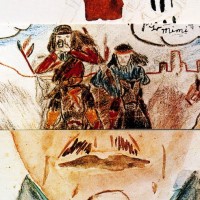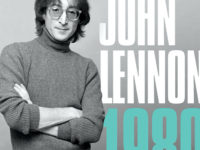As the anniversary of John Lennon’s vicious murder looms on December 8, 2012, we didn’t return to his best-known hits — after all, there’ll be plenty of “Imagine,” “Watching the Wheels,” “#9 Dream” and Beatles favorites to go around. Instead, we dug further back, hoping to uncover new moments of illumination.
What we found were five recommended deep cuts sprinkled across his too-short solo career, with selections from 1970’s Plastic Ono Band through 1998’s posthumously released Anthology. In between, there are also interesting side roads into Mind Games, Double Fantasy and Milk and Honey …
“I FOUND OUT,” PLASTIC ONO BAND (1970): All of the raw emotions surrounding his own disillusionment with the decade, the band, and the youth that Lennon was now leaving behind erupt into scalding series of recriminations on “I Found Out.” Here, and on the equally propulsive “Gimme Some Truth” from 1971’s Imagine, Lennon doesn’t simply take parting shots — he lashes out, tearing to shreds everything in which he once placed his faith.
It’s the scuzzy, street-fighting heart of an album that remains one of the most remarkable musical — and personal — statements ever issued by a major recording artist. And it sounds as angry as it is, as Lennon’s unleashes a series of distorted, slashing riffs over a chugging rhythm courtesy of Klaus Voormann and former Beatles drummer Ringo Starr. Phil Spector was credited as producer on the date but is perhaps no where less present, so nervy and unfettered is this track.
Elsewhere, Lennon confronted demons, talismans and heroes on songs like “Mother,” “Working Class Hero” and “God,” but he never rocked harder on POB than he does here. If those other justifiably well-regarded moments presented tough-minded questions about his (and, of course, our) relationships with such things, then “I Found Out” simply demolished them.
[SOMETHING ELSE! INTERVIEW: Alan White joined us to talk about the genesis of the Plastic Ono Band, and his contributions to early John Lennon recordings like “Instant Karma.”]
“OUT THE BLUE,” MIND GAMES (1973): Recorded at the beginning of his so-called Lost Weekend, when Lennon was separated from wife Yoko Ono, this album sounds just as unfocused, just as in flux, as his private life had become. Ono, it turns out, looms over the entire project — from its Lennon-designed cover image to this tale of once-devoted lovers, now apart, who somehow still seem destined to return to one another.
It’s not hard to see how being away from her would eventually send him into a spiral, so deep was their connection. This song, as much as any other, reveals the depth of that loss. Lennon’s joined at first, in a brilliantly stripped-down format that recalls his work on Plastic Ono Band, by guitarist David Spinozza, pedal steel player “Sneaky Pete” Kleinow and drummer Jim Keltner. Later, he capitulates to polyester-era conventions by adding a group of churchy girl backup singers, but even that can’t snap the spell of this song’s star-crossed reverie.
Unfortunately, these moments are few and far between on Mind Games. For every uptempo rocker like “Meat City” and “Tight A$,” there was a sucker-punch throwaway like “Intuition” and “Only People.” The album could be rightly praised for avoiding the strident political missteps of its predecessor Sometime in New York City, but remains too aimless and, at times, utterly devoid of energy — even with the Top 20 hit title song as a lead in.
A month after Mind Games was released, Lennon left for Los Angeles with girlfriend May Pang — and he would remain there, drinking himself almost out of a career, through the summer of 1974.
[SOMETHING ELSE! INTERVIEW: Joey Molland discusses working with John Lennon on his legendary ‘Imagine’ project, as well as some of Badfinger’s most memorable moments.]
“I’M LOSING YOU,” ANTHOLOGY, (1998): Skip the more polished version found on Double Fantasy, which doesn’t — for some reason — include the original take’s crack group of sidemen: Guitarist Rick Nielsen and drummer Bun E. Carlos from Cheap Trick, and do-anything bassist Tony Levin.
There’s a crunchy, kinetic sizzle here, as John looks back at his own alcohol-induced mid-1970s dumbassed-ness. We get an even deeper sense of the return of Lennon’s muse — the vibrant, angry yang to his bread-making househusband yin. That this version somehow ended up on the cutting-room floor is another reason to reconsider Double Fantasy, even though it became such a rallying point in the wake of his death just weeks later.
The album often ended up more gossamer than necessarily great. Lennon was, at his zenith, a scratched-and-dented treasure, laconic and all edge, and too often on this project he seemed to have settled into middle-aged domesticity — both figuratively and, by employing the prevailing pop veneer, literally.
That’s blown apart by his muscular alternate take on “I’m Losing You,” which emerges with a sinewy new grit. We hear more distinctly the way Lennon was beginning to understand what lay before him — middle age, a settled life, marriage and parenthood — and, how much fight was still left in him. Lennon, blessedly clearer of voice, sounds like a rebel again.
[SOMETHING ELSE! INTERVIEW: Tony Levin talks about working on John Lennon’s final sessions, his trio project with David Torn and Alan White, and the future for King Crimson.]
“NOBODY LOVES YOU [WHEN YOU’RE DOWN AND OUT],” WALLS AND BRIDGES, (1974): When Lennon returned in 1980 with some of the most melodic, contented sounds of his solo career, that gave greater weight to an earlier tune like this one — which taps more complex emotions. “Nobody Loves You” is a key moment on the aptly titled Walls and Bridges, a song that stands as one of the more memorable indictments on rock music’s curious tendency toward necrophilia.
Exiled on the other side of the country from Yoko and New York City, Lennon finally and completely opened himself to an elemental fear of isolation that he once angrily confronted on his initial solo release. A moment of brutal honesty, there is none of the closed-fist bravado that marked Lennon’s recordings of five years before. Instead, he submits to the roiling emotions sparked by endings.
I’m still struck by Lennon’s willingness to strip himself bare. These days, most overlook Walls and Bridges because of its period-piece studio tricks. Yet Lennon remains in complete control of a lyric — and, by 1974, he was being just as hard on himself as he is on everybody else.
Finally, in a harrowing moment, Lennon admits: “Everybody loves you when you’re six foot in the ground.” Not without moments like these, they don’t.
[SOMETHING ELSE! REWIND: ‘Double Fantasy’ never felt dangerous enough to be a great John Lennon record. Much of that was remedied by 2010’s ‘Stripped Down’ reissue.]
“I DON’T WANNA FACE IT,” MILK AND HONEY, (1984): A still-resonant tune with biting introspection, the track begins with the smeared sound of a tape machine engaging — this powerful reminder that Milk and Honey includes the incomplete, posthumous recordings of a murdered genius. Even so, you’ll find that all of the parts are still there, though they are scattered about, in this half-chiseled monument to creative rebirth for Lennon: He works in antithesis, throws away a bit of ageless wisdom, acts a little silly.
From the first, “I Don’t Wanna Face It,” is prototypical Lennon, beginning with an intro that is this dazzling absurdity, Lennon at his wackadoo best: He counts off, in made-up gibberish melding Old World-sounding language with a drunken Lewis Carroll: “Un, deux, eins-zwei-hickel-pickel!” There follows a grinding guitar and, despite that jokey turn to start, ample evidence that Lennon’s illuminatingly personal lyricism was still in tact, despite five years away.
That very disassociative, brutally frank, toss-off attitude — found in Milk and Honey in general, and “I Don’t Wanna Face It” in particular — has ultimately made it more memorably in keeping with Lennon’s uneven solo career, to me, than did the sometimes too-slick Double Fantasy from four years before. The song’s ending is transitional, and probably needed one more take. That works, too, in its way: This is another searing reminder of the fate that lay just around the corner for Lennon on a New York City street.
In the meantime, he rocked a little. We’re richer for this moment, only half varnished, unrepentant and very real.
DEEP CUT HONORABLE MENTIONS: “Money” (That’s What I Want)” [with Eric Clapton, Klaus Voormann and Alan White], Live Peace in Toronto (1969); “Isolation” and “Hold On,” Plastic Ono Band (1970); “Oh My Love” and “How?,” Imagine (1971); “New York City,” Sometime in New York City (1972); “Aisumasen (I’m Sorry),” Mind Games (1973); “Bless You,” Walls and Bridges (1974); “Rip It Up/Ready Teddy,” Rock ‘n’ Roll (1975); “Beautiful Boy (Darling Boy),” Double Fantasy (1980); “Come Together” [with Jim Kelter and the Elephant’s Memory Band], Live in New York City (1986); “Old Dirt Road” [acoustic], Menlove Ave. (1986); “Real Love” [with George Harrison, Paul McCartney and Ringo Starr], Beatles Anthology 2 (1996); “Yer Blues” [with Eric Clapton, Keith Richards and Mitch Mitchell], Rolling Stones Rock and Roll Circus (1996); and “Grow Old With Me” [with orchestration from George Martin], John Lennon Anthology (1998).
- How Deep Cuts on ‘Music From Big Pink’ Underscore the Band’s Triumph - July 31, 2023
- How ‘Islands’ Signaled the Sad End of the Band’s Five-Man Edition - March 15, 2022
- The Band’s ‘Christmas Must Be Tonight’ Remains an Unjustly Overlooked Holiday Classic - December 25, 2016




